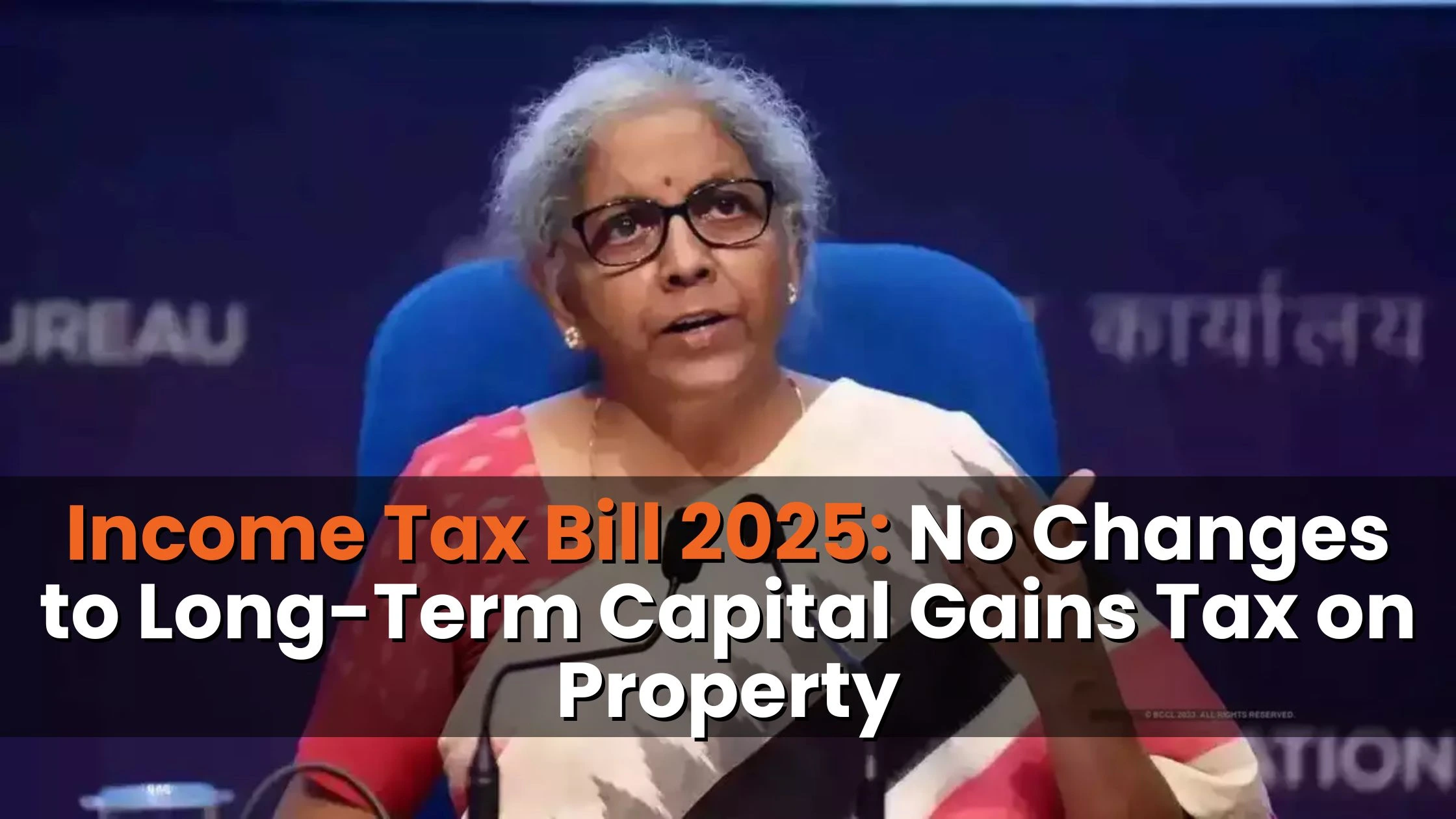Table of Content
▲
The Income Tax Bill 2025 has sparked considerable discussion among property investors and home sellers. One of the key aspects drawing attention is that the Long-Term Capital Gains (LTCG) Tax on property remains unchanged, despite various other modifications in the bill. For properties held for more than 24 months, the LTCG Tax continues at its current rate of 20% (with indexation), ensuring stability in the market.
Additionally, for properties purchased before July 23, 2024, the tax on LTCG is computed as the lower of 12.5% (without indexation) or 20% (with indexation), plus applicable surcharge and cess. This consistency offers predictability and reassurance for both home sellers and investors. In this blog, we delve into what this decision means, how it impacts property transactions, and why this stability is a boon for the real estate sector.
What is Long-Term Capital Gains Tax on Property?
Long-Term Capital Gains (LTCG) Tax is levied on the profit made from selling a property that has been held for a period exceeding 24 months. Under the current framework:
- For properties bought after July 23, 2024:
The LTCG tax on property sales remains at 20%, which is calculated with the benefit of indexation. Indexation adjusts the purchase price for inflation, thereby reducing the taxable gains and providing relief to sellers. - For properties bought before July 23, 2024:
The tax is computed as the lower of 12.5% (without indexation) or 20% (with indexation), plus additional surcharge and cess. This dual rate provides flexibility and can potentially result in a lower tax burden for those who acquired property before the specified date.
Indexation is a crucial factor in determining the actual tax liability, as it accounts for the inflation rate over the period the property is held. This mechanism is particularly beneficial in times of high inflation, as it helps reduce the taxable gain.
Also Read: Banks Revise MCLR rates Post Repo Rate Cut: Latest Updates for Home Loan Borrowers
Key Details of the 2025 Income Tax Bill
- LTCG Tax Rate: The tax rate for long-term capital gains on property sales remains at 20%.
- Holding Period: The property must be held for at least 24 months to qualify for LTCG treatment.
- Indexation Benefit: Sellers can reduce taxable gains by adjusting the purchase price for inflation, potentially lowering the taxable amount by 30-40%.
- Consistency: Despite other changes in the bill, the LTCG Tax on property remains stable, ensuring predictability for long-term investors.
Why the Unchanged LTCG Tax Rate Matters
1. Predictability for Investors and Home Sellers
A key benefit of maintaining the LTCG Tax rate at 20% (with indexation) is the predictability it offers. For home sellers and investors, knowing that the tax rate will remain constant enables more accurate financial planning. This stability allows sellers to:
- Forecast Net Returns:
With a fixed tax rate, it is easier to calculate expected gains after accounting for the indexation benefit. - Plan Sales Strategically:
Sellers can time their property sales to maximize the benefits of the tax provisions, especially if they hold the property long enough to avail indexation benefits.
2. Encouraging Long-Term Investments
The unchanged LTCG Tax rate reinforces the attractiveness of long-term investments in property. Investors are more likely to hold onto properties, thereby maximizing the benefits of indexation. This stability reduces tax uncertainty and encourages investors to pursue long-term capital gains, which contributes to overall market growth.
3. Market Confidence and Stability
A stable tax regime is essential for building confidence among both home buyers and investors. When tax liabilities are predictable, it fosters a more secure investment environment, which in turn attracts more activity in the real estate market. This increased confidence can lead to:
- Enhanced Investment:
Both domestic and international investors may find the real estate market more attractive when they can anticipate stable tax implications. - Economic Growth:
As property transactions become more predictable, the real estate sector can drive broader economic growth by increasing job opportunities, boosting consumer spending, and encouraging urban development.
Practical Implications for Home Sellers and Investors
For Home Sellers
1. Optimized Sales Strategy:
Sellers can plan the sale of their property based on the tax implications. For those who have held their property long enough, the indexation benefit at a 20% rate can significantly reduce their taxable gains.
2. Predictable Financial Planning:
With a stable LTCG Tax rate, sellers can better predict their net returns, allowing for more informed financial decisions regarding reinvestment or savings.
3. Flexibility for Older Properties:
Homeowners who purchased their property before July 23, 2024, may benefit from the lower 12.5% rate if they opt not to use indexation, potentially reducing their tax liability further.
For Investors
1. Long-Term Investment Appeal:
The unchanged tax rate provides a reliable benchmark for evaluating long-term property investments. Investors can project future gains with greater confidence, knowing that the tax rate remains stable.
2. Risk Management:
Stable tax policies reduce the risk associated with property transactions, making the real estate market a safer bet for long-term investments.
3. Portfolio Planning:
Investors can structure their portfolios with the assurance that the tax implications on property sales will be consistent, allowing for better diversification and risk assessment.
Broader Economic Impact
The decision to keep the LTCG Tax rate unchanged, along with the special provisions for properties bought prior to July 23, 2024, has wider implications for the economy:
- Boost in Real Estate Activity:
A stable tax environment encourages more property transactions, which can lead to increased construction activity, job creation, and overall economic growth. - Urban Development:
Predictability in tax policies fosters a more stable market, encouraging both residential and commercial developments. This, in turn, enhances urban infrastructure and contributes to the modernization of cities. - Investor Confidence:
Consistent tax rates reduce uncertainty, thereby attracting more investments in the real estate sector. A thriving property market can lead to improved market sentiment and long-term economic stability.
Conclusion
The Income Tax Bill 2025’s decision to maintain the Long-Term Capital Gains Tax on property at 20% (with indexation) is a significant boon for both home sellers and investors. For properties purchased before July 23, 2024, the option to be taxed at the lower of 12.5% (without indexation) or 20% (with indexation) further enhances this benefit. This stability not only facilitates better financial planning but also encourages long-term investment in the real estate market.
The government has ensured that property transactions remain transparent and fair by providing clear and predictable tax guidelines. Home sellers can confidently plan their sales, while investors can take advantage of the stable tax environment to build robust, long-term portfolios. In a dynamic economic landscape, such stability is crucial for fostering trust and driving sustained growth in the real estate sector.
Understanding these tax provisions is essential for anyone involved in property transactions. Whether you are selling a home or planning your next investment, the current tax framework offers a reliable foundation upon which you can base your financial decisions. Stay informed, plan strategically, and leverage these insights to maximize your returns in the thriving real estate market.
Also Read: Housing Sales in Top 15 Tier 2 Cities Increase by 4%, Sales Value Surges 20% in 2024






Ans 1. LTCG Tax is a tax levied on the profit made from selling a property held for more than 24 months, currently set at 20% with indexation.
Ans 2. For properties bought after July 23, 2024, the LTCG Tax rate is 20%, calculated with the benefit of indexation.
Ans 3. For these properties, the tax is computed as the lower of 12.5% (without indexation) or 20% (with indexation), plus applicable surcharge and cess.
Ans 4. Indexation adjusts the purchase price for inflation, reducing taxable gains and potentially lowering the tax liability for property sellers.
Ans 5. It provides stability, allowing sellers to plan sales strategically and calculate net returns more accurately.
Ans 6. It encourages long-term property investments by ensuring predictable tax implications and reducing investment risks.
Ans 7. No, the LTCG Tax rate on property remains unchanged, offering consistency to the real estate market.
Ans 8. Predictable tax policies build confidence among buyers and investors, fostering market stability and growth.
Ans 9. To qualify for LTCG Tax, the property must be held for at least 24 months before sale.
Ans 10. Sellers can use the indexation benefit or choose the applicable tax rate to minimize their tax burden effectively.